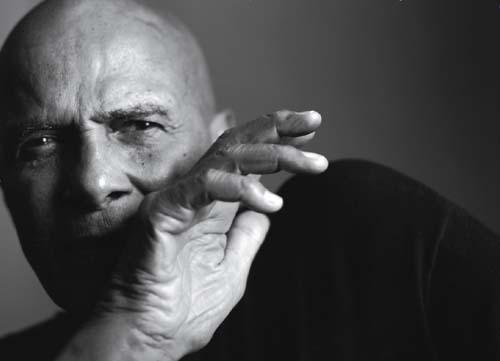Activist-Artist Homed In on Commentary
Grandson Says Media Stoked Fear in Shooter, 84
Homepage photo: Harry Belafonte in New York, 2011. (Credit: Mark Seliger/ Management + artists)
[btnsx id=”5768″]
Donations are tax-deductible.
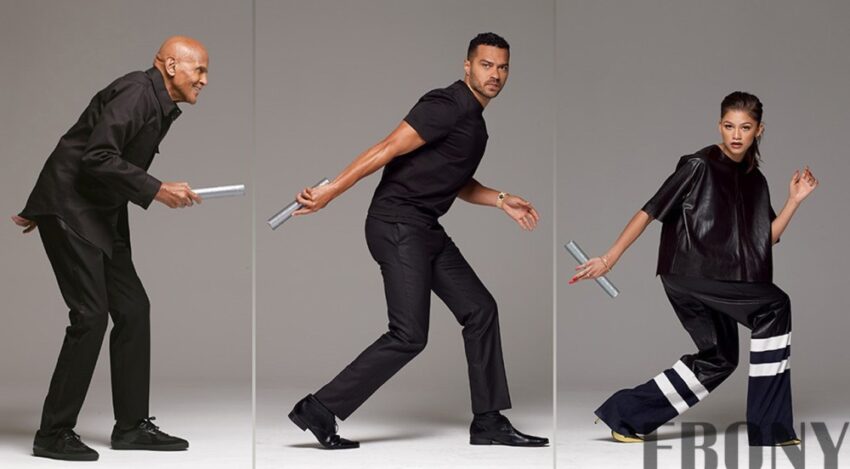
Activist-Artist Homed In on Commentary
Harry Belafonte, the giant of a self-described “activist who became an artist,” didn’t think that opinion writing by Black journalists on the Black community was “really and truly worthy of the embrace of those who grade commentary.”
At least that’s what Belafonte, who died Tuesday at 96 of congestive heart failure, told Journal-isms in 2005 as journalism awards named after his assassinated friend Robert F. Kennedy were bestowed.
Rare was the journalist of color who went to the stage to claim an award from “the largest single program honoring outstanding reporting on the problems of the disadvantaged.”
Belafonte sat on the RFK Memorial board. He said then that the demographics of the winners are “something we are constantly alerted to when we sit,” and that, “certainly, the work we do is deeply rooted in the voices of the people you see absent here.”
But he added, “I’m not sure that the commentary on the Black community by Blacks is really and truly worthy of the embrace of those who grade commentary. I don’t see it in the harvest and the abundance that we should be seeing it.
“There are sprinkles; what I don’t see is the flood,” Belafonte continued. Among the sprinkles, the New York-based Belafonte named columnist Bob Herbert of The New York Times as “way out in front,’ and” broadcast commentator Tavis Smiley.
Although the RFK awards don’t single out commentary, this columnist offered to set up a meeting with Belafonte and the Trotter Group, the national association of African American columnists that included such uncompromising New York-area commentators as the late Les Payne.
Belafonte agreed and provided his office number. But when we attempted to follow up, we never heard from Belafonte again. As it turned out, Belafonte and the Trotter Group would be in Atlanta at the same time that summer, as the National Association of Black Journalists met there.
Apparently, Belafonte had said all he wanted to on the subject.
The news media were part of the engine that boosted Belafonte to the top in the 1950s as a singer of Americanized calypso tunes, as an actor and as an activist.
In most cases the news media were followers, not leaders in pushing Belafonte to the top. Entertainment media played more of a role. The news media didn’t rate much of a mention in the artist’s 2011 memoir, co-author Michael Shnayerson confirmed for Journal-isms Tuesday.
Harry Belafonte sat down with journalist Charlayne Hunter-Gault for the “PBS News Hour” in 2018 to mark the 50th anniversary of Martin Luther King Jr.’s assassination. Belafonte remembered how he and King met and explained why he believed the United States was more racially divided than any other moment in his life. (Credit: PBS/YouTube)
Yet “My Song: A Memoir” mentions the profiles in the era’s widely read magazines, the Saturday Evening Post, Look, Life and, of course, Ebony. Publications named Belafonte one of the top three Black entertainers in the country and “America’s Negro Matinee Idol.”
For the adventurous and curious, massive scrapbooks of Belafonte’s press coverage from the 1940s, through the civil rights movement into the 1970s and beyond, are housed at New York’s Schomburg Center for Research in Black Culture. The Schomburg acquired Belafonte’s personal archives in 2020.
Not that all of the press was adoring. On Tuesday, the New York Amsterdam News, a pillar of the Black press, posted two stories and a video.
But in 1957, the paper ran the headline, “BELAFONTE WEDS WHITE DANCER,” and cited in its story a saying from the 1920s, “Give a Negro man fame and fortune, and he’s got to have a white woman, a Packard car, and a bulldog,” Henry Louis Gates Jr. recalled in his 1997 book, “Thirteen Ways of Looking at a Black Man.” The reference was to Julie Robinson, the only white dancer in the Katherine Dunham Company. Gates wrote that Robinson “knew a lot more about African and African American folk culture than Belafonte did.”
Gates also wrote that Belafonte recalled for him a news conference “where a Trinidadian journalist berated him for styling himself King of Calypso when he had never been to Trinidad, home of the art form, and had no contact with its traditions.
“Belafonte replied that he had no control over how his record label promoted him, and conceded that he wasn’t really a calypso singer. ‘And then I said, “I’ll tell you, though, that I find that most of the culture coming out of Trinidad among calypso singers is not in the best interests of the people of the Caribbean community. I think that it’s racist, because you sing to our own denunciation on color. You sing about our sexual power, and our gift of drinking, and rape, and all the things we do to which I have, and want, no particular claim.
“What I have sought to do with my art is take my understanding of the region and put it before people in a positive way. And doing these songs gives people another impression than the mythology they have that we’re all lazy, living out of a banana tree, f—ing each other to death.'”
He was also unapologetic about Americanizing his calypso. “There were great calypsonians who could never see the light of day in this country, because they were so distanced from this culture. Now I came along and I modified the dialect. I put it into a rhythm that was more closely identified with the American scene. If, instead, I came in and sang this stuff with a thick Jamaican accent, it would have been like listening to Italian opera.”
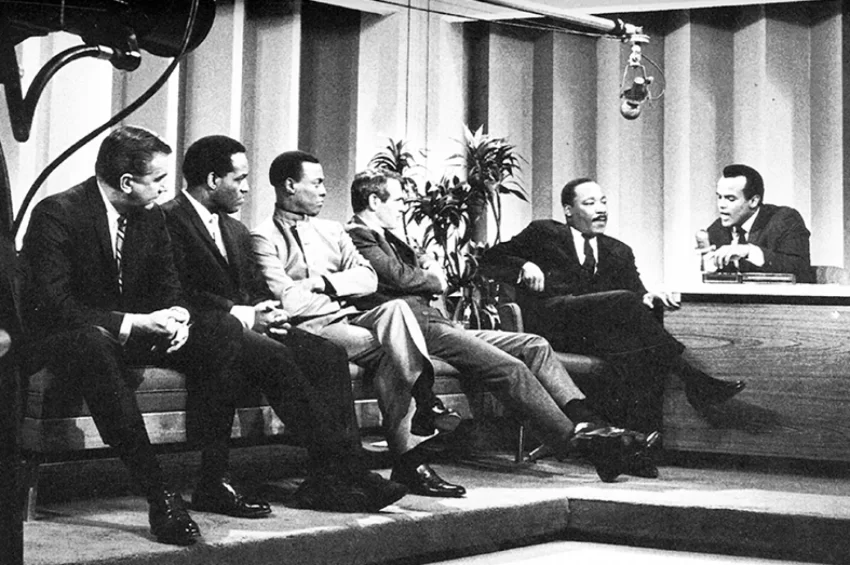
Belafonte used his knowledge of media to maximum effect during the 1963 March on Washington, where his close friend Martin Luther King Jr. delivered his “I Have a Dream” speech.
Belafonte directed the celebrities on where to sit to be in prime camera range.
Black journalists weren’t the only objects of Belafonte’s disappointment for what he contended was letting down the struggle.
In 2013, he was asked, “Are you happy with the image of members of minorities in Hollywood today?”
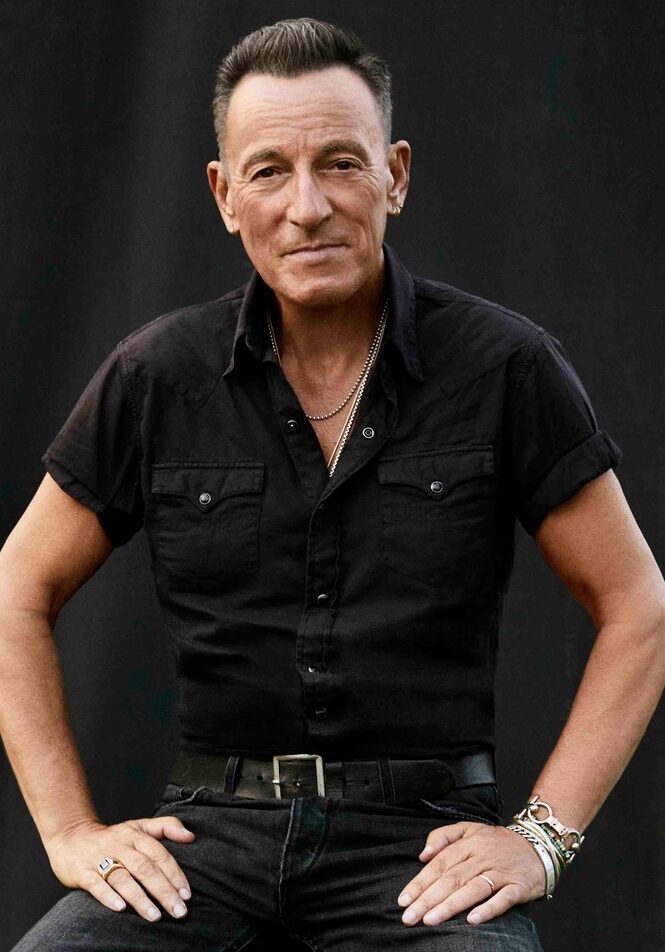 “Not at all,” Belafonte replied. “They have not told the history of our people, nothing of who we are. We are still looking. … And I think one of the great abuses of this modern time is that we should have had such high-profile artists, powerful celebrities. But they have turned their back on social responsibility. That goes for Jay-Z and Beyoncé, for example. Give me Bruce Springsteen (pictured), and now you’re talking. I really think he is Black.”
“Not at all,” Belafonte replied. “They have not told the history of our people, nothing of who we are. We are still looking. … And I think one of the great abuses of this modern time is that we should have had such high-profile artists, powerful celebrities. But they have turned their back on social responsibility. That goes for Jay-Z and Beyoncé, for example. Give me Bruce Springsteen (pictured), and now you’re talking. I really think he is Black.”
Belafonte and Jay-Z eventually reached an accommodation.
As for Black journalists, while Belafonte declined in 2005 to engage with those he accused of being insufficiently conscious, he did acknowledge in a follow-up conversation that the RFK organization — and he — needed to conduct more outreach to find the work that journalists of color are doing along the lines he discussed.
Meanwhile, Belafonte took to the airwaves and op-ed pages to show what he meant.
In 2002, he “denounced Secretary of State Colin L. Powell in a radio interview . . . likening him to a plantation slave who abandoned his principles to ‘come into the house of the master.’ Mr. Powell called the characterization ‘unfortunate,’ ” as Todd S. Purdham reported then for The New York Times.
In 2016, when Donald Trump first ran for president, Belafonte wrote an op-ed for the Times that resonates today.
It began by quoting poet Langston Hughes’ “Let America Be America Again.”
“Mr. Trump, who is not a poet, either in his late-night tweets or on the speaker’s stump, sees American greatness as some heavy, dead thing that we must reacquire. Like a bar of gold, perhaps, or a bank vault, or one of the lifeless, anonymous buildings he loves to put up,” Belafonte wrote.
“It is a simplistic notion, reducing all the complexity of the American experience to a vague greatness, and his prescription for the future is just as undefined, a promise that we will return to ‘winning’ without ever spelling out what we will win — save for the exclusion of ‘others,’ the reduction of women to sexual tally points, the re-closeting of so many of us.
“With his simple, mean, boy’s heart, Mr. Trump wants us to follow him blind into a restoration that is not possible and could not be endured if it were. Many of his followers acknowledge that (‘He may get us all killed’) but want to have someone in the White House who will really ‘blow things up.’
“What old men know is that things blown up — customs, folkways, social compacts, human bodies — cannot so easily be put right. What Langston Hughes so yearned for when he asked that America be America again was the realization of an age-old people’s struggle, not the vaporous fantasies of a petty tyrant. Mr. Trump asks us what we have to lose, and we must answer, only the dream, only everything.”
- Wil Haygood, Washington Post: Harry Belafonte’s biggest hit? The song of freedom.
- Craig Jenkins, Vulture/New York: Harry Belafonte Dragged Us Into the Future| The late legend ditched stardom for something far greater. (April 26)
- Roy S. Johnson, al.com: Onward, Harry Belafonte (April 27)
- Journal-isms: Poitier Loved Journalists, Except When He Didn’t (Jan. 9, 2022)
- Stephanie Kaloi, People: Harry Belafonte’s Family: Remembering the Legend’s Life With His Spouses and Kids
- Lisa Keys, Times of Israel: Harry Belafonte, who popularized ‘Hava Nagila’ in the US, dies at 96 (April 26)
- Lord Melody, YouTube: Booboo Man / Mama Look a Boo Boo (first recorded 1955)
- Victoria Uwumarogie, Essence: Photos Of Harry Belafonte And His Children Over The Years

Grandson Says Media Stoked Fear in Shooter, 84
“When Klint Ludwig learned his grandfather, a White homeowner in Kansas City, had shot a Black teenager who rang his doorbell, Ludwig was repulsed — but not entirely surprised,” Holly Yan reported Friday for CNN.
“ ‘The warning signs were there. I wasn’t shocked when I heard the news,’ ” about 84-year-old Andrew Lester, Ludwig told CNN on Thursday. ” ‘I believe he held – holds – racist tendencies and beliefs.’ “
Yan also wrote, “Klint Ludwig said he was disturbed by racial comments made by his grandfather in the past, including about Black people.
“He said his grandfather believed in right-wing conspiracy theories and was influenced by the ‘fear and paranoia’ stoked by some right-wing media, which was often ‘blaring in his living room.’ . . .
“But Ludwig’s older brother, Daniel, reportedly disputed the notion that race played a role when their grandfather . . . shot 16-year-old Ralph Yarl in front of his door on April 13.
“ ‘I was disgusted. I thought it was terrible. We – myself and my family – stand with Ralph Yarl in seeking justice,’ Klint Ludwig said. ‘This is a horrible tragedy that never should have happened.’
“When asked why he decided to speak out against his grandfather, he replied, ‘It’s the right thing to do.’
“Too often in the US, the younger brother said, ‘people get away with killing unarmed, innocent Black people.’
“ ‘People need to speak out,’ he said, ‘not make any excuses for this kind of behavior and this violence.’ . . . ”
Double Whammy: Carlson, Lemon Each Ousted
April 24, 2023
. . . End of Cable News ‘Most Racist’ Show
. . . ‘I Am Stunned,’ Says Star CNN Anchor
Gail Christian, Pioneer On-Air Journalist, Dies at 83
[btnsx id=”5768″]
Donations are tax-deductible.
. . . End of Cable News ‘Most Racist’ Show
“In a shock announcement Monday, Fox News Media said that it would be parting ways with Tucker Carlson, the host of its 8 p.m. program Tucker Carlson Tonight,” Alex Weprin wrote Monday for the Hollywood Reporter.
“Carlson’s final show was on Friday.
“ ‘Fox News Media and Tucker Carlson have agreed to part ways. We thank him for his service to the network as a host and prior to that as a contributor,’ the company said in a statement.
“Fox says a rotating slate of guest hosts will fill in at 8 p.m. on a show now called Fox News Tonight until a replacement is found.
“No reason was given, but initial news reports noted, as did Oliver Darcy and Marshall Cohen of CNN, “The announcement came one week after Fox News settled a monster defamation lawsuit with Dominion Voting Systems for $787.5 million over the network’s dissemination of election lies.”
As Derek Hawkins, Sarah Ellison and Blair Guild recalled in The Washington Post, “In grievance-filled monologues on Fox’s weeknight prime-time spot, Carlson advanced the false notion pushed by former president Donald Trump and his supporters that the Jan. 6, 2021, attack on the Capitol was a peaceful protest.
“But his on-air rhetoric was in dramatic opposition to private sentiments he shared with colleagues, in which he professed to ‘passionately’ hate Trump and yearn for the end of his presidency. Those private communications, which were released as part of Dominion Voting Systems’ defamation lawsuit against Fox News, showed how Carlson struggled to publicly support the president’s false voter-fraud theories that he privately scoffed at.”
Stephen Battagio reported a different reason for Carlson’s ouster in the Los Angeles Times:
“Carlson’s exit is related to the discrimination lawsuit filed by Abby Grossberg, the producer fired by the network last month . . . sources said. Carlson’s senior executive producer Justin Wells has also been terminated, according to insiders.
“Grossberg was moved off of ‘Sunday Morning Futures With Maria Bartiromo’ and onto ‘Tucker Carlson Tonight,’ where she alleged she was bullied and subjected to antisemitic comments, according to a lawsuit in New York.
“In deposition testimony, the former Fox News producer also said she was coerced by company lawyers to give misleading answers in the Dominion defamation case against the network. Fox News denied the claim and said she was terminated for disclosing privileged company information. . . .
“In a statement, attorneys for Grossberg suggested her suit was a key factor in Carlson’s exit.
“ ‘Tucker Carlson’s departure from Fox News is, in part, an admission of the systemic lying, bullying, and conspiracy-mongering claimed by our client, former top producer, Abby Grossberg,’ said Tanvir Rahman, one of Grossberg’s attorneys. ‘Mr. Carlson and his subordinates remain individual defendants in the [Southern District of New York] case and we look forward to taking their depositions under oath in the very near term . . . ‘
“Murdoch also was said to be concerned about Carlson’s coverage of the Jan. 6, 2021, insurrection at the U.S. Capitol. The host has promoted the conspiracy theory that it was provoked by government agents, and Carlson has called Ray Epps — a Texas man who participated in the storming of the Capitol but did not enter the building — an FBI plant, without presenting any evidence. . . .”
In a series in 2022 in The New York Times, reporter Nicholas Confessore called Carlson’s program “the most racist show in the history of cable news.”
The Times analyzed 1,150 episodes of “Tucker Carlson Tonight” and produced a series that began with “How Tucker Carlson Stoked White Fear to Conquer Cable.”
Confessore later told Journal-isms, “I would say that what distinguished our story was two major elements. One was our extensive reporting from inside Fox, showing beyond any doubt that Carlson and his bosses were aware that he was importing racist material from the far right — and in fact chose to do more and more of it because it boosted ratings and had become part of their business model.
“The other was our database, constructed by my colleague Karen Yourish, which documented the frequency and range of his use of ideas formerly caged on the far right, taking readers out of the realm of anecdote and into the world of hard facts.”
Despite the defamation settlement, as David Bauder wrote Saturday for the Associated Press, “Experts doubt the settlement will lead to much of a course correction in conservative media, save for a little less specificity to avoid future lawsuits.“
- Joshua Benton, Nieman Lab: Tucker Carlson is out at Fox News, and what matters is why
- Madeline Peltz, Media Matters for America: Tucker Carlson’s descent into white supremacy: A timeline (Oct. 28, 2018, updated April 7)
- Journal-isms: How Can We Counter Carlson’s Racial Poison (July 28, 2022)
- Julia Rock, Rebecca Burns and Matthew Cunningham-Cook, The Lever: Fox Can Claim Tax Writeoff For Defamation Settlement

. . . ‘I Am Stunned,’ Says Star CNN Anchor
“Don Lemon is out at CNN,” Michael M. Grynbaum, John Koblin and Benjamin Mullin reported Monday for The New York Times.
“In an announcement that Mr. Lemon said left him ‘stunned,’ CNN on Monday declared an end to its longtime relationship with Mr. Lemon, a star anchor who was a fixture of the network’s prime-time lineup before enduring a short but controversial tenure as a morning show co-host.
“ ‘CNN and Don have parted ways,’ Chris Licht, CNN’s chairman, said in a statement. ‘Don will forever be a part of the CNN family, and we thank him for his contributions over the past 17 years. We wish him well and will be cheering him on in his future endeavors.’
“That benign language contrasted sharply with Mr. Lemon’s interpretation of the day’s events. In a scathing message on Twitter, he told viewers that his talent agent had abruptly informed him ‘that I have been terminated by CNN.’
“ ‘I am stunned,’ Mr. Lemon wrote. ‘After 17 years at CNN I would have thought that someone in management would have had the decency to tell me directly. At no time was I ever given any indication that I would not be able to continue to do the work I have loved at the network.’ (CNN disputed Mr. Lemon’s account, saying the anchor ‘was offered an opportunity to meet with management but instead released a statement on Twitter.’)
“One of CNN’s most recognizable stars, Mr. Lemon had a reputation as a fiery political commentator during his eight years as a prime-time anchor. But inside the network, he began to lose support after he made remarks in February about women and aging that were widely perceived to be sexist. The incident generated a national uproar and a rare public rebuke from CNN’s chairman . . . Licht. . . .”
Lemon spoke out frequently against racism, but even the National Association of Black Journalists had to call him out in 2015, when Lemon pushed the limits after the massacre of Black parishioners in Charleston, S.C.
“The shootings in Charleston also have led to a debate on the Confederate flag, which flies on the statehouse grounds in Columbia,” then-NABJ President Bob Butler said then.
“On CNN Monday night, anchor Don Lemon jumped into the national fray when he held up the flag and asked if it offended people. It clearly does — especially African Americans, whom it reminds of the notion of white supremacy and a time when it was OK to enslave, lynch and discriminate against African Americans. It is so offensive that South Carolina Gov. Nikki Haley says it’s time for it to be removed from the state capitol.
“But during the same segment, Lemon held up a sign with ‘The N-word’ on it and asked viewers if they were offended. This comes in wake of the news that President Obama, often criticized for soft-pedaling on racial matters, had used the word on comedian Marc Maron’s podcast to make a point about how far we still have to go in this country as it pertains to race.
“The difference in Obama and Lemon’s use of the word is stark: The president was trying to make a valid point about the volatile nature of the country’s race relations; Lemon could have asked the question without showing the word on television.
“To use the N-word, perhaps the most vile word in the American vocabulary, to take an impromptu and unscientific survey about its maliciousness was an inappropriate stunt that distracts from what the country ought to be talking about – how we relate to one another. Instead, we are focusing on one word that only begins to peel away hundreds of years of racial hate and inequality in this country.
“As members of the news media we all have an obligation to do better.”
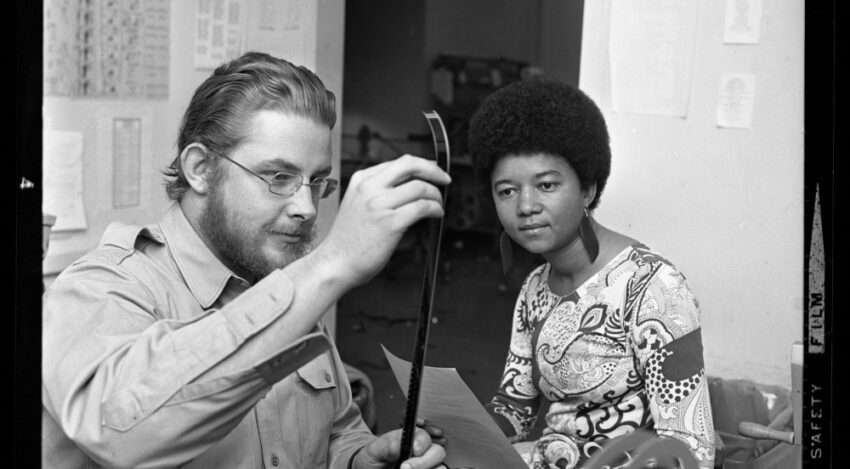
Gail Christian, Pioneer On-Air Journalist, Dies at 83
“Gail Christian, who broke barriers as a Black on-air correspondent and rose to national prominence at NBC News and PBS, died on April 12 in Los Angeles,” ” Alex Williams reported Saturday for The New York Times. “She was 83.
“The cause was complications of recent intestinal surgery, said her spouse, Lucy DeBardelaben.
“Ms. Christian overcame a troubled youth — including a prison stint for armed robbery — to carve out a career as a prominent television journalist and news executive in the 1970s and ’80s, an era when the industry was dominated by white men.
“She became a visible presence in American living rooms with her coverage for NBC News of the trial of Patricia Hearst, the newspaper heiress who was kidnapped in 1974 by a band of leftist revolutionaries called the Symbionese Liberation Army, and who was convicted two years later for participating in a bank robbery with the group.
“But for Ms. Christian, it was not enough simply to gain exposure as a rare Black face on the evening news.
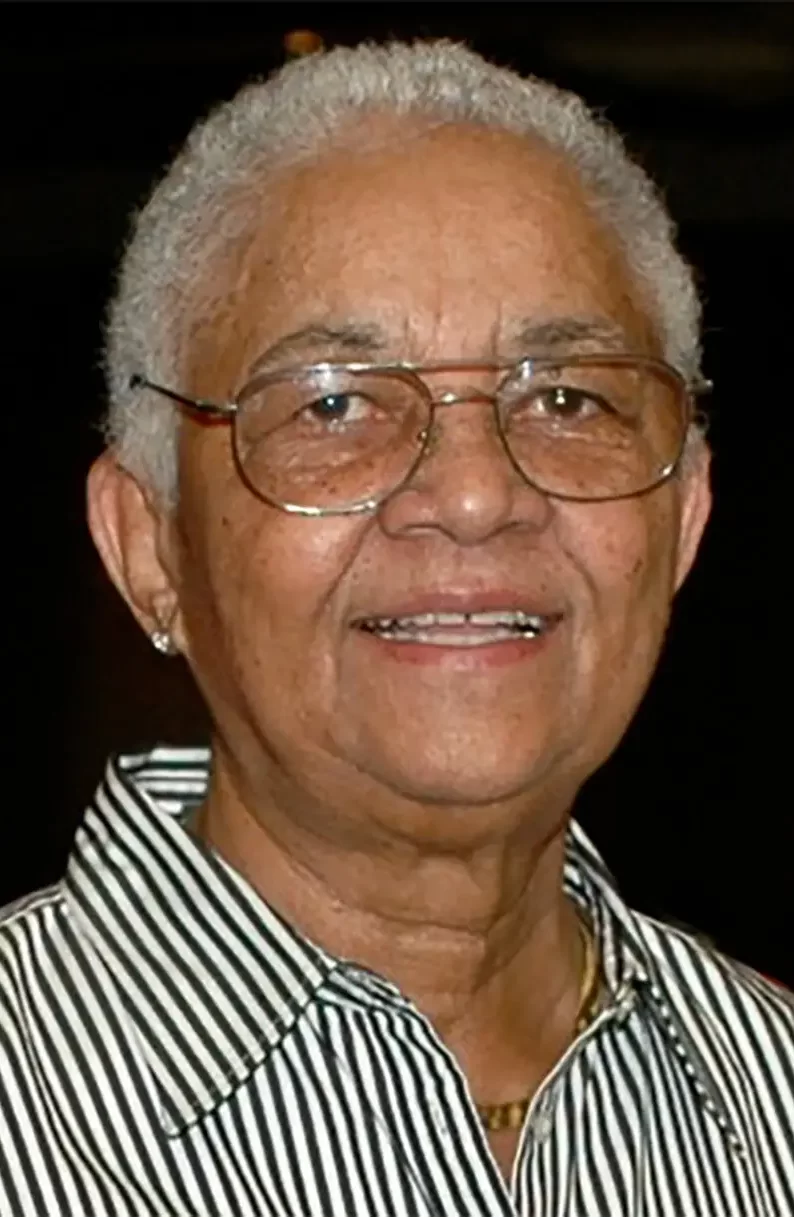 “ ‘I always wanted to be “the Black reporter,” as in covering Black stories,’ she said in an interview with The Chicago Tribune in 1986. ‘I felt that was the reason I was there. I didn’t resent it in the least. I felt then, as I feel now, it is very dangerous for a group of people to live in a society where they are not allowed to interpret themselves.’ . . . (Photo: Christian in 2022. Credit: via Lucy DeBardelaben)
“ ‘I always wanted to be “the Black reporter,” as in covering Black stories,’ she said in an interview with The Chicago Tribune in 1986. ‘I felt that was the reason I was there. I didn’t resent it in the least. I felt then, as I feel now, it is very dangerous for a group of people to live in a society where they are not allowed to interpret themselves.’ . . . (Photo: Christian in 2022. Credit: via Lucy DeBardelaben)
“After two years at NBC News, Ms. Christian became the news director of the public station KCET in her native Los Angeles, where she created a ’60 Minutes’-style investigative series called ’28 Tonight’ (the station was on Channel 28).
“That program featured several award-winning segments, including one about a banking scandal that hurt low-income communities and another about a chemical spill in Orange County that caused illnesses in the area. Both segments won Peabody Awards. . . .
“In 1970, she took part in an 11-week summer program for minority students in broadcast journalism at Columbia. (Geraldo Rivera was a classmate.) Two years later, she was hired by KNBC, the local NBC affiliate. She worked there for six years before being hired by NBC News. . . .
“Her tenure at PBS ended in 1989, shortly after the network found itself embroiled in controversy for airing a pro-Palestinian documentary called ‘Days of Rage,’ which Ms. Christian had acquired and was responsible for vetting. A news report asserted that the film had been backed in part by undisclosed Arab funding, which its producer denied.
“In an interview with The New York Times, Ms. Christian said that she had resigned from PBS for other reasons. ‘You burn out because this is a no-win situation,’ she said. ‘You get silence when things go well and outrage when there are questions.’ ”
‘[btnsx id=”5768″]
To subscribe at no cost, please send an email to journal-isms+subscribe@groups.io and say who you are.
Facebook users: “Like” “Richard Prince’s Journal-isms” on Facebook.
Follow Richard Prince on Twitter @princeeditor
Richard Prince’s Journal-isms originates from Washington. It began in print before most of us knew what the internet was, and it would like to be referred to as a “column.” Any views expressed in the column are those of the person or organization quoted and not those of any other entity. Send tips, comments and concerns to Richard Prince at journal-isms+owner@
View previous columns (after Feb. 13, 2016).
View previous columns (before Feb. 13, 2016)
- Diversity’s Greatest Hits, 2018 (Jan. 4, 2019)
- Book Notes: Is Taking a Knee Really All That? (Dec. 20, 2018)
- Book Notes: Challenging ’45’ and Proudly Telling the Story (Dec. 18, 2018)
- Book Notes: Get Down With the Legends! (Dec. 11, 2018)
- Journalist Richard Prince w/Joe Madison (Sirius XM, April 18, 2018) (podcast)
- Richard Prince (journalist) (Wikipedia entry)
- February 2018 Podcast: Richard “Dick” Prince on the need for newsroom diversity (Gabriel Greschler, Student Press Law Center, Feb. 26, 2018)
- Diversity’s Greatest Hits, 2017 — Where Will They Take Us in the Year Ahead?
- Book Notes: Best Sellers, Uncovered Treasures, Overlooked History (Dec. 19, 2017)
- An advocate for diversity in the media is still pressing for representation, (Courtland Milloy, Washington Post, Nov. 28, 2017)
- Morgan Global Journalism Review: Journal-isms Journeys On (Aug. 31, 2017)
- Diversity’s Greatest Hits, 2016
- Book Notes: 16 Writers Dish About ‘Chelle,’ the First Lady
- Book Notes: From Coretta to Barack, and in Search of the Godfather
- Journal-isms’ Richard Prince Wants Your Ideas (FishbowlDC, Feb. 26, 2016)
- “JOURNAL-ISMS” IS LATEST TO BEAR BRUNT OF INDUSTRY’S ECONOMIC WOES (Feb. 19, 2016)
- Richard Prince with Charlayne Hunter-Gault, “PBS NewsHour,” “What stagnant diversity means for America’s newsrooms” (Dec. 15, 2015)
- Book Notes: Journalists Follow Their Passions
- Book Notes: Journalists Who Rocked Their World
- Book Notes: Hands Up! Read This!
- Book Notes: New Cosby Bio Looks Like a Best-Seller
- Journo-diversity advocate turns attention to Ezra Klein project (Erik Wemple, Washington Post, March 5, 2014)

